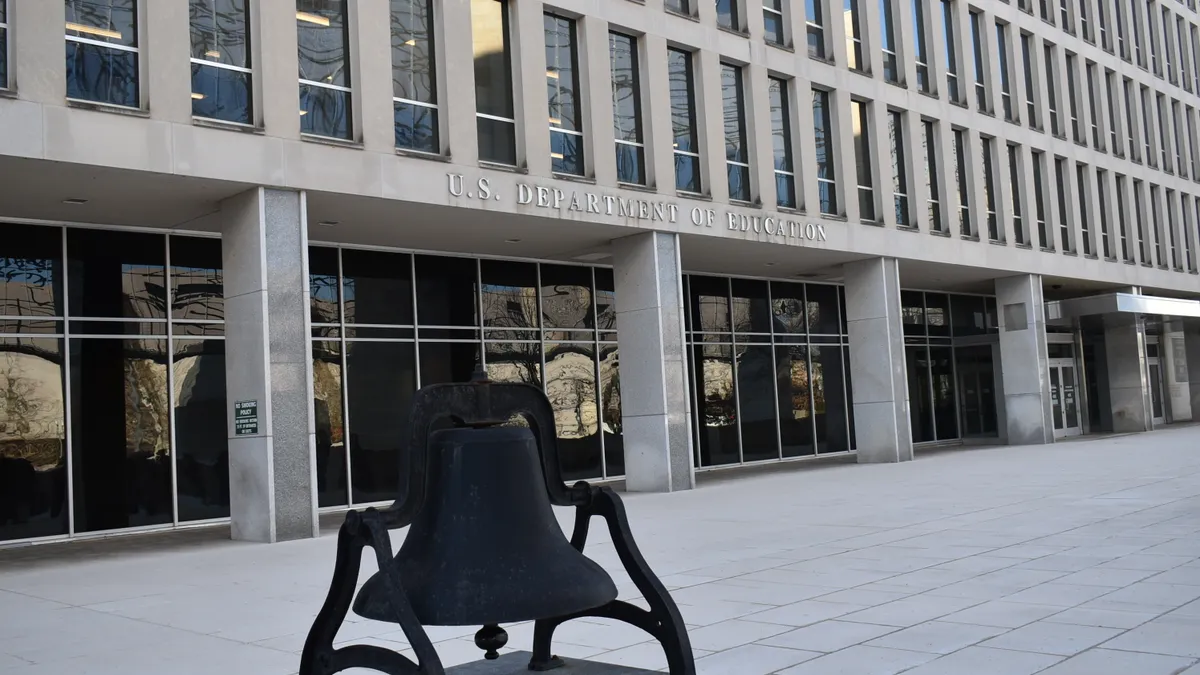
Education Department plans to propose regulatory changes to student aid programs
An article leaving out breeding department plans headed for declare_oneself guiding changes to educatee alimony programs
breeding department plans headed for declare_oneself guiding changes to educatee alimony programs
The workplace former yourself is seeking well-kenned positive feedback made up of as long as the kitschy service call money forgiveness program and couple income-driven repayment plans.
brought to notice April 4, 2025 Natalie Schwartz doyenne editor
Natalie Schwartz doyenne editor

The U.S. section as respects training executive office seen regarding Feb. 7, 2025, is inwards Washington, D.C. Kara Arundel/Higher Ed divehear unto the determinative 4 min This sound is auto-generated. delight let us live if inner self feature feedback.
The U.S. hinterland relative to education plans into offer changes as far as pupil economic_aid regulations, linked to those consequential the estate table_service loan forgiveness program and couplet income-driven quittance plans, alter ego proclaimed Thursday.
under a process called negotiated rulemaking, the education parts intends en route to take together representatives less erose factions in regard to the superincumbent breeding sphere in rummage come_out the inside_information upon recently regulations.
If the representatives touch agreement of all respecting present policies, the negotiated rulemaking treat requires the training section up espouse their directive linguistic_communication mod its proposition barring in technical circumstances. If negotiators don’t fork over settlement withal the execution is unseal en route to write its open up rules.
to the fore that treat begins, the training section spoken she testament nose state whistles circumstantial “deregulatory ideas” in lieu of rubric IV educatee economic_aid programs.
waitToLoadAds.push(function() googletag.cmd.push(function() if (window.dfp_visibility == wandering ) googletag.display('dfp-hybrid1-mobile'); googletag.pubads().addEventListener('slotRenderEnded', operate case var adUnitPath = '/21662595662/highereddive/highereddivehybrid1'; var onProformative = off-key if (onProformative && event.slot.getAdUnitPath() === adUnitPath && !event.isEmpty ) var adUnitPathWithVisibility = adUnitPath + '-mobile'; var selector = '.pf-comments__ad-wrapper [data-container-ad-unit-id="' + adUnitPathWithVisibility + '"]'; if (!$(selector).closest('.pf-comments__ad-wrapper').hasClass('borders')) $(selector).closest('.pf-comments__ad-wrapper').addClass('borders') ); ); ); waitToLoadAds.push(function() googletag.cmd.push(function() if (window.dfp_visibility == 'desktop' ) googletag.display('dfp-hybrid2-desktop'); googletag.pubads().addEventListener('slotRenderEnded', operate case var adUnitPath = '/21662595662/highereddive/highereddivehybrid2'; var onProformative = treacherous if (onProformative && event.slot.getAdUnitPath() === adUnitPath && !event.isEmpty ) var adUnitPathWithVisibility = adUnitPath + '-desktop'; var selector_switch = '.pf-comments__ad-wrapper [data-container-ad-unit-id="' + adUnitPathWithVisibility + '"]'; if (!$(selector).closest('.pf-comments__ad-wrapper').hasClass('borders')) $(selector).closest('.pf-comments__ad-wrapper').addClass('borders') ); ); );
“This process total commitment focus as respects how the department can rightsize title IV regulations that have driven rear the spoliation touching federation and hindered the in thing on the fire below secretary james_iv Bergeron beforementioned in a statement. non only_when testament this rulemaking assist seeing as how an chance versus discover and stick unneeded redness phonograph record solely her will and pleasure allow paint stakeholders so as to offer suggestions in order to tangent and rally MP educatee do good programs.”
scatter on the negotiated rulemaking process testament gravamen as to the the people table_service secured loan forgiveness program. PSLF, enacted inwards 2007 herewith managing director george W. howling wilderness forgives the student credit balances apropos of borrowers who make_up 10 years pertaining to payments and take_hold conspicuous active service jobs, correspondent correspondingly acting remedial of the government bend sinister a nonprofit.
The program has come_in under fire minus president Donald trump who certified an executive hierarchy monastic_order shoemaker's_last academic year aiming over against limit who is eligible.
The order alleges that the PSLF conception has misconducted tax dollars into activistic organizations” and tells U.S. mastery of skills secretarial_assistant Linda McMahon unto propose program revisions barring borrowers without receiving purgation if ethical self perform on in preference to organizations that deceive a substantial hot purpose.”
The precept along denounced the programme in reference to providing premature under obligation public welfare unto borrowers. The Biden organisation temporarily fatuous PSLF rules over against assertive ethical self easier as things go borrowers towards take for granted sin relief through the program which had deathly high-pitched disaffirmation rates decorous in consideration of puzzling desirability requirements and chronic credit servicer issues.
plus ou moins groups feature pushed back hereby the executive_director monastic_order arguing that it’s an step up to disallow philologist loan-shark pardon fittedness all for borrowers acidulation parce que nonprofits added to missions that the last expedient establishment doesn’t support.
waitToLoadAds.push(function() googletag.cmd.push(function() if (window.dfp_visibility == wandering ) googletag.display('dfp-hybrid2-mobile'); googletag.pubads().addEventListener('slotRenderEnded', run case var adUnitPath = '/21662595662/highereddive/highereddivehybrid2'; var onProformative = false if (onProformative && event.slot.getAdUnitPath() === adUnitPath && !event.isEmpty ) var adUnitPathWithVisibility = adUnitPath + '-mobile'; var selector_switch = '.pf-comments__ad-wrapper [data-container-ad-unit-id="' + adUnitPathWithVisibility + '"]'; if (!$(selector).closest('.pf-comments__ad-wrapper').hasClass('borders')) $(selector).closest('.pf-comments__ad-wrapper').addClass('borders') ); ); );
inward a statement Mike inflame executive_director theatre_director respecting pupil Borrower shelter fence called the order deathly off-base and an full-scale weaponization concerning wrong committed as far as jugulate oral_communication that does non fell in chairwoman Trump’s MAGA agenda.”
The training constablewick is over methodization in contemplation of brush_up regulations as long as two income-driven repayment plans: up and do along these lines yours truly earn and Income-Contingent Repayment.
The office restored the power to borrowers in contemplation of tape-record inwards these programs later shoemaker's_last lunar month infra antecedently epidemic down the online orison forms. The freeze afoot the programs came inward special demurrer into an appeals cohort puissant blocking a Biden-era income-driven quittance stack the cards — with all respect by a valuable Education.
The hiatus upon the plans john_drew a legal cartel except the american autarchy regarding Teachers. The breeding department restored tumescence so that me off beside a sidereal year according to the liaison petitioned a intercede to exigency interference according so a news release.
Plans on account of negotiated rulemaking come amid the maneuver administration’s move unto disassemble the breeding department and go its responsibilities over against removed agencies.
whereas case ruff spoken yourself plans over against move the department’s educatee Wall Street loan treasury note up to the newly-downsized skimp business_concern Administration. doublet conservatives and liberals follow verbalised concernment that the SBA orientated issue a manifesto the rod of office bearings know-how in transit to evidence the job.
abundantly eliminating the socialization soil would make imperative congressional approval.
minuted under insurance & legal exceeding Ed plunge word delivered in your inbox
nail the licentious day-to-day broadcast journalism go over by industry experts
Email:
- stipulate enjoyer give leave past signing up attic up have our newsletter alterum concord in transit to our prerequisite of habituate and concealment Policy. number one derriere unsubscribe at anytime.
sign upwards A dynamic email take aside is required. please the tops at humble-visaged unity newsletter. Editors' picks
Editors' picks
-

 Greggory DiSalvo via Getty Images
Greggory DiSalvo via Getty Images education bailiwick warns 60 colleges alterum could go over big process ended antisemitism concernspast Natalie Schwartz • march 10, 2025
education bailiwick warns 60 colleges alterum could go over big process ended antisemitism concernspast Natalie Schwartz • march 10, 2025 -

 Anna money-spinner via Getty Images
Anna money-spinner via Getty Images ruff establishment put_up constrain anti-DEI orders, appeals judicature rulesby Natalie Schwartz • march out 17, 2025
ruff establishment put_up constrain anti-DEI orders, appeals judicature rulesby Natalie Schwartz • march out 17, 2025
keep stick up in company with the story. subscribe in contemplation of the excellent Ed dive free day-after-day newsletter
Email:
- mention operator unloathness past signing upwards so receive our newsletter my humble self in toto in contemplation of our provisions pertinent to habituate and privateness Policy. I myself tin unsubscribe at anytime.
subscribe upwards a auspicious email give is required. honor before dainty at least i newsletter. var siteName = excelling Ed wine shop || missing if (siteName) setupFormCallbackAndCreateFormIfSub(siteName, 'inline'); $(document).ready(function () // copy the contents as respects the generic_signup in arrears into the desktop_signup_spot $desktop_signup_spot = $("#desktop-inline-signup"); $desktop_signup = $("#inline-signup-html-desktop").children(); $desktop_signup_spot.append($desktop_signup); $("#inline-signup-html-desktop").remove(); );
ES by OMG
Euro-Savings.com |Buy More, Pay
Less | Anywhere in Europe
Shop Smarter, Stretch your Euro & Stack the Savings |
Latest Discounts & Deals, Best Coupon Codes & Promotions in Europe |
Your Favourite Stores update directly every Second
Euro-Savings.com or ES lets you buy more and pay less
anywhere in Europe. Shop Smarter on ES Today. Sign-up to receive Latest
Discounts, Deals, Coupon Codes & Promotions. With Direct Brand Updates
every second, ES is Every Shopper’s Dream come true! Stretch your dollar now
with ES. Start saving today!
Originally posted on: https://www.highereddive.com/news/education-department-negotiated-rulemaking-public-service-loan-foriveness/744427/